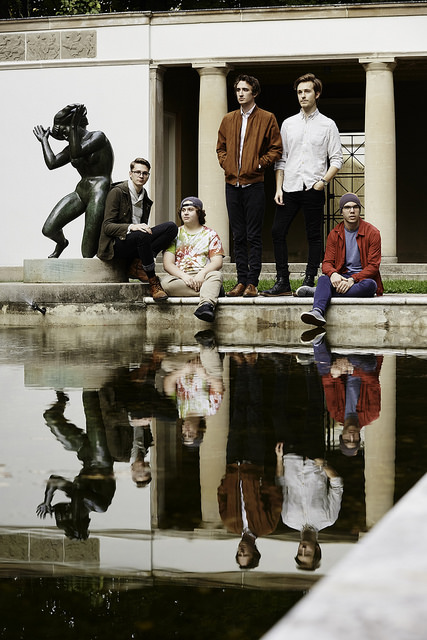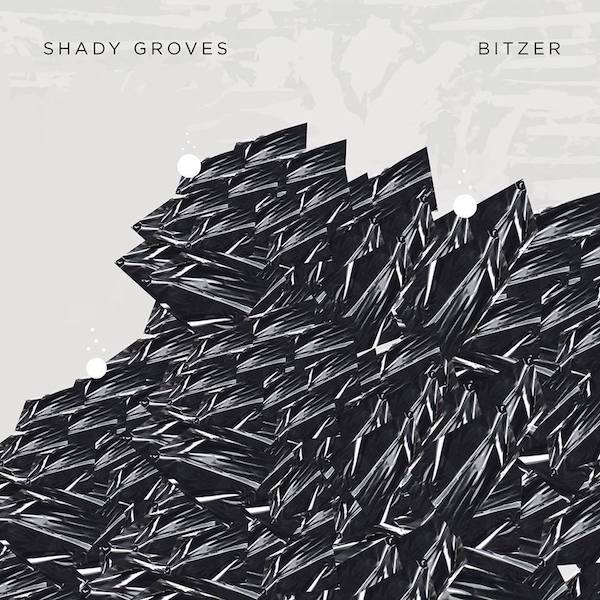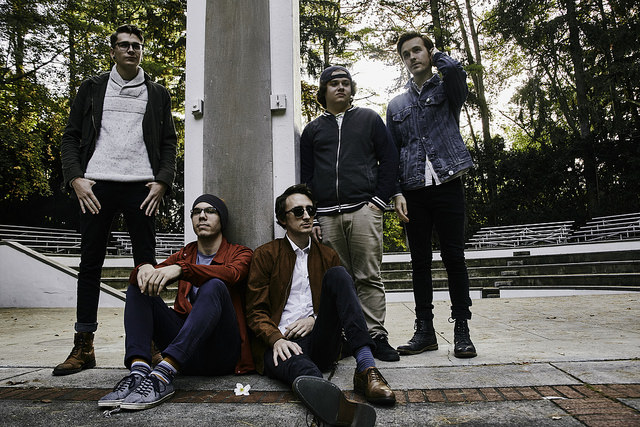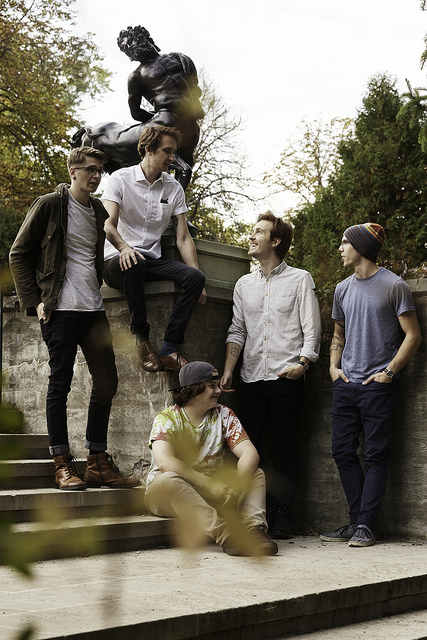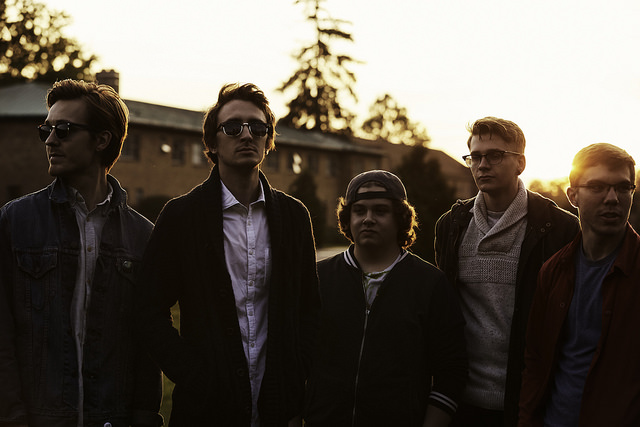In a year riddled with the loss of so many musical icons and titans — Bowie, Haggard, Prince, Cohen — it felt perverse to see so many publications eager to throw a whole genre onto the funeral pyre. But that seemed to be the fate befalling indie rock, as countless thinkpieces abounded on the slow decline of this once-fertile scene. Even artists themselves bemoaned the new state of affairs, best summed up by Vampire Weekend’s Rostam Batmanglij wondering aloud in an interview: “What happened to all the bands?”
But if any place knows how to stand tall in the face of proclamations of its impending doom, it’s Detroit, where the members of Shady Groves are steadily plying their trade as they negotiate what it means to be “a band” today. While their workaday demeanors may connect them to hometown heroes like MC5 or The Von Bondies, Shady Groves’ style is closer aligned with acts such as Menomena or The Dismemberment Plan — indie stalwarts who wear their love for unorthodox sounds and non-rock influences on their sleeves.
Bitzer, the act’s first album, covers a lot of sonic ground: introspective folk numbers, gimlet-eyed ambient reveries, and majestic multi-instrumental anthems. These coexisting styles — the result of three separate songwriters — are held together by the group’s shared sense for mood and melody. Now with some additions to their roster and the departure of an originating member, Shady Groves are ready to deliver a new vision that’s more cohesive but just as cutting-edge.
Detroit Music Magazine met with Adam Fitzgerald and Dylan Caron of Shady Groves to chat about where they’ve been and where they’re headed. Fitzgerald, who started Whateverfest, has an enterprising spirit and expressive personality that evinces a desire to connect with others. Caron is less forthcoming, but no less thoughtful; his reticence shows deliberation rather than inhibition. Their dynamic is natural and easygoing, giving you the sense that they were always meant to be in a band together. And in a field where you’ve got to get used to shifting tastes and changing trends, that support system is critical. Though indie rock may not be at its mid-’00s peak, Shady Groves are proving that the valleys can be just as breathtaking.
Let’s start at the beginning. How did Shady Groves form?
Adam Fitzgerald: Dylan and I have been making music together for a long time, almost ten years.
Dylan Caron: Yeah, probably. It started with The Kodaks, which was a band Adam formed, what, in high school?
AF: At the very end of high school.
DC: 2009-ish. And I’ve been in many bands with Adam and our former drummer, Jeff [Yateman]. We’ve been in bands together since first grade. [laughs] I think it was you [Adam] who approached me and Jeff to join The Kodaks, and then that became something else.
AF: Right. Yeah, The Kodaks was all over the place. I recorded in Nashville with that project, ‘cause for a while I was the only constant member. Eventually it got more serious. We went through so many different members, and I did a couple different tours. I started working with Jeff, ‘cause he was making hip-hop and producing all this other stuff at the time. He was coming into his own as a producer and an engineer. And Dylan hadn’t been doing anything for a while, ‘cause he had been in bands constantly for years. So that’s when The Kodaks got more serious, really, was when it was Dylan, Jeff, me, and then our friend Matt Hoffman, who is now in Valley Hush. Matt and I did a band called Moon Lake after The Kodaks broke up. So The Kodaks was definitely our first real experience, and it just fell apart, because we were all young and busy and shit like that.
But yeah, we’d been making music together forever, and that was when we really all realized we had great chemistry together. Dylan and I became friends in high school, even though we went to different high schools, like across town. But we realized quickly that we had the exact same taste in music, so that was pretty important. Like all across the spectrum, too. We like hip-hop. We like a lot of old music from all over the place, but then we like a lot of new artists. So even when Moon Lake was taking time off or broke up, we were all jamming: Dylan, Matt Hoffman, and I. We were writing songs. When I think of the beginning of Shady Groves, I think of “Plain Dream,” that song. Dylan showed me that song, and he’s the type of guy who writes something amazing and is like, “Oh, I did this thing, and like, it’s nothing.”
Then he showed it to me, and I’m like, “No, that’s something! That’s amazing; we should record that.” We just finished it, quickly. It all came together pretty quickly. And then he did the mandolin part. It felt like something was forming, but it wasn’t professional enough, because I guess at this point we had done music long enough to where it was just like a “why even do it unless you’re gonna do it right” type of thing. It’s just like we’re getting too old. We have adult responsibilities and things like that, you know?
Then we eventually ended up hanging out with Jeff again, ‘cause we hadn’t hung out with him in a while. Dylan and I had these songs, so we started talking with Jeff. And we decided, “Hey, why don’t we start recording some songs together,” ‘cause Dylan, Jeff, and I all had songs we were working on. So then somehow that became Shady Groves.
What was the creation of your first album, Bitzer, like?
DC: We all wrote like three songs. That’s why we called it Bitzer, just ‘cause it’s like Adam contributed three, I contributed three, Jeff contributed three. And then we had those B sides we released as well, which was kind of last-second for me. [laughs] Then that was like a fourth from each of us, from the three originating members. And I guess that’s the creation of it.
AF: Yeah, Bitzer is Australian slang for like a mutt, or like a bitch. And it’s also Australian slang for what they say is “a contraption made of previously unrelated parts.” That’s what a “bitzer” is. So that was what the idea was. Jeff writes these really, kind of like prog-rock, almost?
DC: Psychedelic-y, intricate…
AF: Psychedelic, really good stuff. More like angular, almost, I would say.
DC: Yeah.
AF: But it was all very melodic. That’s why we knew it would go together, ‘cause I kind of do like, I dunno, spacey… I dunno what to call it.
DC: I write all my songs with an acoustic guitar, and I don’t really mess with effects unless I’m at practice or something.
AF: Now you got the big board, though. You got all the effects you could want.
DC: Yeah. [laughs]
AF: So then, I dunno, everything started with Jeff, Dylan, and I: Dylan and I had songs, Jeff had some songs, I had some songs, Dylan had some songs. But the only ones that were collaborative were really between Dylan and I. We would help each other finish our own songs, but Jeff’s songs were pretty much always him, all the time. We started playing out, because we had a guy from The Vonneguts fill in for us a while. And then we met Jamie [Dulin], who’s our bass player, and Jamie’s the man.
DC: Yeah, ‘cause when we started, you and I would trade bass. I would play keyboard and guitar. It was like, “we need five members.” [laughs]
AF: Oh yeah. Bitzer was this labor of love of the three of us, of Jeff, Dylan, and myself. We just worked on those songs tirelessly. Jeff pretty much had his things recorded by himself, so Dylan and I just had to figure out what we were doing, and it came together pretty quickly.
DC: Yeah, you knew Jamie ‘cause you had interviewed him.
AF: Yeah, when I was a journalist, I interviewed Jamie ‘cause he was in something. Like he had just graduated high school, and he was in some hardcore band. They were breaking up, and I was like, “Dude, you’re so talented. You should join our band.” Little did I know how talented he really was. I mean, he plays bass. He plays piano, keyboards, and synths. He plays saxophone, and so he added saxophone to the record. Jamie came into the fold right when we were finishing Bitzer, and he said his friend Colt [Caron] played keys. We were like, “Well, I dunno about that,” ‘cause we had already just let Jamie in, and we were just getting used to him.
And then Colt came over, and it was pretty much a great fit. That was right when we were finishing it, so those two ended up actually being on “Coyotes.” So the only song that actually has the five of us as it was “Coyotes.” That was the only song that wasn’t done yet. Colt recorded the keys on “Coyotes” and Jamie the bass. And that was it. Then we did the B sides. We put it out – just the nine songs – and released the three as B sides, so 12 total.
It’s been an interesting road, but we’ve been really happy ‘cause we’ve had a crazy reception. Like, really really good reception. We got rated one of the best Michigan-made albums by The Oakland Press, so that was cool. And then we’ve been getting random write-ups in Germany and New York and California and all over Europe. We’ll get notifications on Facebook sometimes that we’re being played on the radio somewhere, ‘cause it’s pretty much everywhere. I mean it’s on Spotify; it’s on iTunes; it’s on YouTube; it’s on Bandcamp; it’s on SoundCloud. It’s pretty much everywhere.
We were playing a lot of shows once it was the five of us: Adam, Dylan, Jeff, Colt, and Jamie. We were playing lots of shows and everything was going pretty well, and then we just decided to move in another direction.
What does this new direction look like?
DC: I’d say more collaboration. We still have our own songs, but there’s more of Adam and I writing together. I mean, even Jamie and Colt, they each are contributing a song on this new album. I mean I’m sure it’s still gonna have a lot of the same feeling Bitzer did, this second album, but every album evolves for everyone. I’m still keeping my same roots. I always write acoustic songs. I, at least, can always tell an Adam song when I hear it, as far as the guitar tones and singing. But I’d say this newer album just has a lot more hands in the jar. Colt is writing his parts for songs. Jamie is writing bass lines.
AF: We’re gonna have a lot more saxophone, ‘cause Jamie plays saxophone. We’re adding that live now, too, which we never had before. It’s something I always wanted to do. It’s really cool, ‘cause fuckin’ Colt, he’s crazy and just bought so much equipment recently. [laughs] Both of them, even though they’re young, are so talented. They’re real-deal musicians, so certain songs, like at the end of “Trials,” Jamie will stop playing bass and start playing saxophone. And Colt will take over playing synth and bass.
So on songs that didn’t feature saxophone, for example, are you incorporating those parts?
DC: No, but we have been making it a point at rehearsals that we want to make our live show different than our album. That was one thing about the past Shady Groves shows is that we kind of just played our album. We skipped a few tracks; we played a couple newer songs sometimes. But we really want to make it a live show, as opposed to just coming and hearing us play our songs. We want to have more for people who want to come see us as far as just a better experience. For them to leave and be like, “Wow, they were really good live. I should listen and see what they sound like on CD.” So that’s another thing that we’re working on at rehearsals. But right now, it’s kind of getting redundant because Sage [Denam] just joined. And we’re trying to—
AF: Just perfect songs that Dylan and I have… Some of these songs – like “Plain Dream” and “Hourglass,” for example – are probably the two most popular singles, and those are like the two oldest songs. Dylan and I have been working on those forever, so we’ve heard these songs a million times. But to the younger guys, we’re still perfecting our live groove – the five of us – and it’s finally clicking. And like Dylan said, we’re really trying to make it like a show – almost like an experience more – ‘cause so many bands get up there and just play. I feel like most of the time you go out, and most bands just suck. They really do. And it’s just like, “Why?”
For me, like I was saying earlier, we’re just too old to keep doing it and not do it right. And obviously we care about these songs. We’re taking the time to write these songs and record these songs and do all this shit. So we want it to be right, and the guys who are in the band with us are really great at what they do. I feel like they really get it, and they’re getting into it more and more. Now on this second album, like Dylan was saying, they’re writing their parts more. On certain songs Dylan and I will write lyrics and the melodies together and then maybe do the choruses or work out layered vocal parts. And then each of us will write our own verse parts. Then it’ll pretty much be done, and we’ll have a rough demo or whatever. We’ll bring it to the guys, and they’ll all add their parts. So there’s a lot more being added into this album from each member on more of the songs.
DC: It’s being filtered through even more musicians, basically, than just the first album.
What do you do exactly to make your live show special? How do you make it an experience for the people attending?
DC: Well, I wish that we could bring Colt’s light show, but they usually always have lights! [laughs] Where we’re rehearsing right now, Colt’s got a pretty crazy lighting setup, so we always feel like we’re playing a show everywhere.
AF: Did I tell you my sister just got a fog machine?
DC: Yeah, we should bring that to practice.
AF: But yeah, little things like that, you know?
DC: Transitions.
AF: Transitions!
DC: Yeah, that you’re not going to hear on an album. Maybe we’ll play a transition from one song to the other, and you don’t really know where it’s going.
Do you have any extended jams?
DC: Yeah, that’s kind of like the idea. Like I said, right now that’s in the works, because our rehearsals are excruciatingly redundant. It’s just running through the set like three times and packing up.
AF: We’ve already been playing – we’ve already been a band – for like a year with Jeff. And then we almost— We didn’t have to start over, but we definitely got set back a couple pegs. But luckily, Sage just picked it up really quick, and now we’re getting to the point where – like [Dylan] was saying – not everything we play is just like how it is on the album anymore. And that’s fun.
DC: I’m finding, too, when we all first get to practice, we usually have like 15 to 20 minutes of just jamming. Just randomness, off the top of our heads, and we’re getting better and better at that. We’re definitely going to incorporate that into our live performances. Just kind of going off and taking you somewhere else for a minute and bringing it back to the songs.
What can we expect from the second album, both musically and lyrically? You mentioned that it’s more cohesive in that it’s no longer bits and pieces – two or three songs written by one band member each – but in terms of the sound itself and the ideas or themes that you’re exploring, what’s different this time around?
AF: We’re now trying to figure out the vibe of the album, and I feel like we just did figure it out – what we want to say. We’re definitely more in on it together, instead of as you [Dylan] were saying that each man is saying his own thing and doing his own thing. Now we kind of have a group effort.
DC: Adam and I are experimenting a lot more. I don’t want to call it “progressive” or “experimental” music, because Jeff’s songs were another level of that.
AF: [laughs] Yeah.
DC: But as far as what Adam and I wrote for Bitzer and what our normal writing process is, we’re thinking out of the box more. We’re trying to play with effects more and add more instruments.
AF: At the core of it, it is like pop music. Especially our songs on Bitzer – “Hourglass” and “Plain Dream,” “Stay Strange” and “Coyotes” – they’re pretty poppy. They’re melodic, ‘cause that’s the music we like. We’ll like random Top 40 garbage songs. Most of it I hate, you know, but every once in a while there’ll be a good song that just gets to you, and I like that. I like music that sounds good. I like music that’s catchy, but I love artists that mess with it, like Tame Impala. I love a band like The Beatles, but I also love a band like The Velvet Underground, because they were off-kilter. They really played with the ideas of what you can do with songs, and The Beatles did too, eventually. We just like music from all periods and eras – as far back-reaching as you can find and as far as what artists are doing now. Incorporating different genres is something we’ve always tried to play with. We were at a show once, and these ladies were yelling at us, “What genre are you?” One of us said, “We don’t have one.” I thought that was a perfect, genuine moment for Shady Groves.
Despite losing Jeff, I think we all feel good about where we are going with our second album, and we are happy Jeff is doing his own thing with [his new project] Animate Daze. This next album is going to be different for us because if anything, we are older. Things change, life happens. We have all been going through some shit, as everyone does. It forces you to grow. We’ve been talking a lot about this concept of acquiescence – which, at least for me, is the idea of accepting the way things are, being ok with that, and moving forward. I think we all have to accept certain circumstances we might not agree with, like the world at large today in general – it’s a mess – but you just have to go with it and do your thing. That might sound dumb but acquiescence is the concept of passively accepting something. It doesn’t mean obedience, but it means compliance. For us, this second record is about that idea: not making waves, but riding the waves. I’ve also read that acquiescence can mean confused, so maybe it’s even more apt for us in that sense. Every one of us in this band loves music in a different way, and we like the idea of music being personal. There’s a lot of love in music, in all aspects, from all directions. We want people to interpret what they want, whether from our music or if that’s with our sound or our lyrics or whatever. We just want people to feel something.
Catch Shady Groves for what may be their last show in a while this Thursday, December 8 at The Loving Touch with Taxon Clade & Catty Club. Tickets are $5 with doors at 8:00 p.m. For more information on Shady Groves, visit their Bandcamp page.
All photos by Nick Kassab.
